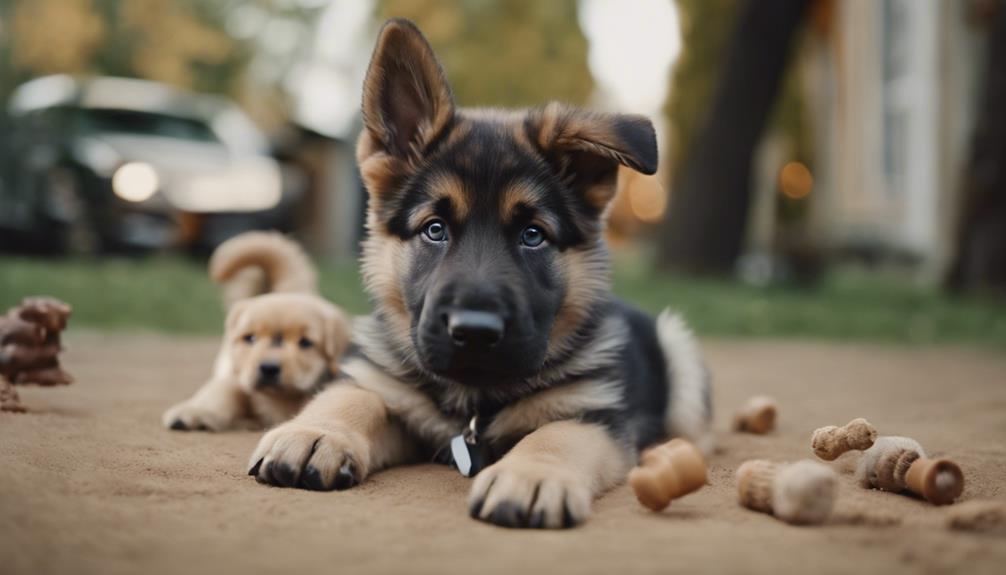🐾 Paw-some Partnership Alert! 🐾
As a pack of German Shepherd enthusiasts at MixGermanShepherd.com, we're always sniffing out the best products for our furry friends. Guess what? When you fetch something from Amazon through our links, we earn a little treat! 🦴
As you embark on the journey of understanding the intricate tapestry of growth in German Shepherd mix puppies, you will witness a transformation akin to a caterpillar turning into a butterfly. Each stage holds its mysteries and challenges, shaping these remarkable canines into the loyal companions they are destined to become. From the vulnerable neonatal stage to the confident adult phase, the development of German Shepherd mixes is a fascinating process worth exploring further. Understanding these stages can provide valuable insights into how to nurture these puppies effectively and ensure their well-being throughout their life journey.
Key Takeaways
- Neonatal stage: Birth marks reliance on mother and basic reflexes.
- Transitional stage: Shift to solid foods and socialization with littermates.
- Socialization period: Exposure to varied experiences shapes well-adjusted adult behavior.
- Adolescent stage: Hormonal changes require consistency and positive reinforcement for maturity.
Neonatal Stage

During the neonatal stage, German Shepherd mix puppies are born blind, deaf, and entirely reliant on their mother for care and nourishment. This period, lasting around 2 weeks, is crucial for their development. German Shepherd mix puppies have a lower body temperature compared to adult dogs, necessitating a warm environment for their well-being. They depend solely on their mother's milk for sustenance and growth during this phase of rapid development.
The umbilical cord, a vital connection to the mother in the womb, dries up and falls off shortly after birth, signifying the puppies' transition to a more independent life. In this stage, basic reflexes and movements start to emerge, laying the groundwork for future growth and interaction. It is essential to provide a safe and secure space for the mother and her puppies during this time to ensure their health and well-being. As these young ones are entirely dependent, the care and attention they receive during the neonatal stage play a significant role in shaping their future growth and development.
Transitional Stage

As German Shepherd mix puppies progress from the neonatal stage, their introduction to solid foods and the exploration of their surroundings mark the onset of the transitional stage. During this phase, typically around 2-4 weeks old, these puppies begin the process of weaning off their mother's milk and start to explore solid foods for their nutritional needs. Socialization plays a crucial role in the transitional stage as interactions with littermates and humans help in shaping proper social skills and behaviors. German Shepherd mix puppies might exhibit initial signs of independence as they venture away from their mother and littermates to discover their environment.
| Transitional Stage Characteristics | |
|---|---|
| Weaning Process | Puppies start transitioning from mother's milk to solid foods for nutrition. |
| Socialization | Interaction with littermates and humans becomes vital for developing social skills and behaviors. |
| Exploration | Puppies show curiosity and start exploring their surroundings, displaying initial signs of independence. |
| Sensory Development | Eyes and ears begin to open and function, marking the beginning of sensory development in puppies. |
| Behavioral Traits & Personality | Emerging traits and characteristics provide insights into the puppy's future social interactions and learning abilities. |
Socialization Period

The critical socialization period for German Shepherd mix puppies, aged between 5-12 weeks, is a pivotal stage in their development. During this time, it is crucial to expose them to various environments and experiences to build confidence and reduce fear. This period presents an opportunity to teach them basic commands, help them interact positively with other animals, and foster a strong bond with their human family. Proper socialization at this stage plays a significant role in preventing behavioral issues later in life, contributing to the development of a well-adjusted and sociable dog. By ensuring that they have positive interactions with different people, places, and situations, you are shaping their temperament and behavior in a positive manner. Early socialization is key to laying the groundwork for a well-rounded and adaptable adult dog, emphasizing the importance of gentle introductions to new stimuli and fostering a positive outlook on the world.
Juvenile Stage

Moving from the critical socialization period, the juvenile stage marks a significant phase in the development of German Shepherd mix puppies. This developmental phase, typically occurring between 3 to 6 months of age, is crucial for shaping the behavior and temperament of your furry companion. Here are some key points to consider during the juvenile stage:
- Exploration: Mixed breed puppies are curious and eager to explore their surroundings. Encourage safe exploration to help them learn about the environment.
- Socialization: Focus on positive interactions with other animals and people to promote good social skills in your German Shepherd mix.
- Basic obedience training: Introduce simple commands like sit, stay, and come to lay the foundation for more advanced training later on.
- Appropriate behaviors: Use consistent training and positive reinforcement to teach your puppy what behaviors are acceptable and desirable.
Proper socialization during this stage plays a vital role in helping your German Shepherd mix grow into a well-adjusted adult dog.
Adolescent Stage

During the adolescent stage of German Shepherd mix puppies, they undergo hormonal changes that may lead to increased independence. This phase, typically spanning from 6 to 24 months, is crucial for further training and socialization to shape their behavior positively. To ensure a well-adjusted adult, it is essential to maintain consistent routines, provide mental stimulation, and reinforce positive behaviors. Adolescence is a critical period where proper guidance is necessary to address any behavioral challenges promptly. Owners should be prepared to invest time in training and socializing their German Shepherd mix during this developmental stage. Seeking professional guidance can be beneficial if faced with difficulties, as experts can provide valuable insight and strategies. By fostering positive behaviors and offering the necessary support and structure, you can help your adolescent German Shepherd mix mature into a well-behaved and balanced adult companion.
Adult Stage

As German Shepherd mix puppies transition into the adult stage, their physical development continues alongside a sustained need for mental stimulation and regular exercise. German Shepherd mixes typically reach adulthood between 2-3 years of age. Here's what you can expect during the adult stage:
- German Shepherd mix puppies may still fill out and develop physically during the adult stage.
- They remain active and love exercise, requiring regular physical activity to stay healthy and happy.
- Mental stimulation is key for adult German Shepherd mixes, as they enjoy challenges and tasks that keep their minds engaged.
- Continuing training and providing exposure to new experiences is beneficial for adult German Shepherd mixes, helping them remain well-rounded and adaptable.
Frequently Asked Questions
How Long Do German Shepherds Act Like Puppies?
German Shepherds typically act like puppies for about 2 to 3 years as they transition into adulthood. During this time, their playful behaviors, energy levels, and training challenges can vary based on factors like genetics and environment.
How Big Is a 12 Week Old German Shepherd?
At 12 weeks, a German Shepherd mix puppy can weigh 20-30 pounds, standing 15-20 inches tall at the shoulder. Proper nutrition, exercise, and socialization are vital for healthy growth. Embrace their playful energy, and enjoy their developing size!
What to Expect From a 11 Month Old German Shepherd?
At 11 months old, your German Shepherd mix will show improved impulse control and attention. Expect teenage challenges, progressing training, enhanced social skills, high energy levels, potential behavioral changes, increased exercise needs, mental stimulation, health considerations, ongoing obedience training, and bonding opportunities.
What Is the Juvenile Stage of a German Shepherd?
During the juvenile stage, a German Shepherd experiences significant behavioral changes, training challenges, high energy levels, socialization needs, teething phase, exercise requirements, temperament shifts, independence levels, growth spurts, and playful interactions. It's a crucial developmental phase.
Conclusion
In conclusion, the development stages of German Shepherd mix puppies are crucial for their overall well-being and behavior. Did you know that proper socialization during the critical period of 3 to 12 weeks can significantly impact a dog's behavior for the rest of their life? By understanding and addressing the specific needs of German Shepherd mixes at each stage of development, you can help ensure they grow into well-adjusted and happy adult dogs.
